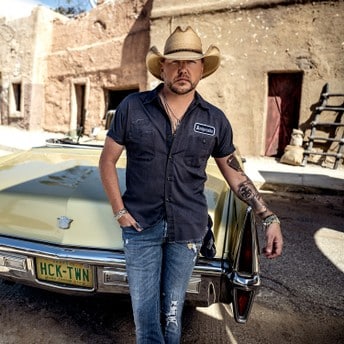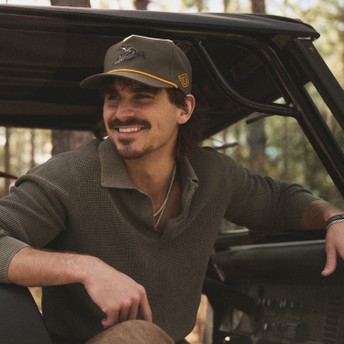genre country
Page: 11
Trending on Billboard
This week, Kaitlin Butts celebrates inking a label deal with Republic by issuing a tender revamping of a Jimmy Eat World hit. Meanwhile, Riley Green teams with Jamey Johnson for a robust new collab, and ERNEST, Sammy Arriaga and newcomer Joshua Slone also offer new tracks.
Explore
See latest videos, charts and news
Check out all of these and more in Billboard‘s roundup of some of the best country, bluegrass and/or Americana songs of the week below.
Kaitlin Butts, “The Middle”
Butts, who recently inked a deal with Republic Records, offers up a revamped version of Jimmy Eat World’s 2001 hit, transforming it into a soothing, hopeful, acoustic-driven track driven by guitars, fiddle and understated percussion. Butts’ version comes across as tender, wise and thoughtful, particularly on lines such as “Just do your best, do everything you can/ And don’t you worry what their bitter hearts are gonna say.” That’s a timeless message people of all ages can cling to.
Jamey Johnson and Riley Green, “Smoke”
Jamey Johnson welcomes Riley Green for this barn burner, intertwining Johnson’s weathered, gravelly vocal with Green’s burnished twang as they explore the motif of “smoke” with varying meanings throughout the heartbreak-driven track. At various points throughout “Smoke,” the titular phrase references the plumes billowing from an ex’s tires as she speeds away, or the wisps of smoke curling from the end of the lit cigarette he’s using to obscure his pain. Green and Johnson wrote the song with Erik Dylan and recorded the track at the Cash Cabin and Big Gassed Studios, with production from Kyle Lehning and Jim “Moose” Brown, which captures complementary ties between Johnson and Green’s distinct styles.
ERNEST, “Blessed”
In his latest, ERNEST weaves a tale of love and legacy, as this song looks at a piece of land being handed down generation after generation. “Granddaddy bought this slice back in 1962/ It came with a barn, a dog in the yard and a Chevrolet painted blue,” he sings, before sketching his own dreams of passing the land down to his son. Reserved guitars, bass and drums put ERNEST’s vocal at the fore, as he brims with pride about passing down wisdom he hopes his son will continue learning from. “Blessed” precedes ERNEST’s upcoming project Live From The South, out Nov. 21.
Sammy Arriaga, “Before the Next Teardrop Falls”
First-generation Cuban American Sammy Arriaga bridges cultures and languages, combining English and Spanish-language tracks on his bilingual country Latin album Heart in Texas, which released Oct. 31. The album also includes Arriaga’s heartfelt, Spanglish rendition of Latin country trailblazer Freddy Fender’s classic “Before The Next Teardrop Falls” (Fender’s original topped both the Billboard Hot Country Songs chart and Hot 100 in 1975). Arriaga’s version simultaneously pays graceful homage to Fender’s original, while, like the rest of the songs on the album, Arriaga stamps every lyric and message with his unique artistry and warm, welcoming vocal tone.
Joshua Slone, “Your Place at My Place”
Slone makes a striking entrance with his 16-song, debut album Thinking Too Much, which features Slone as the sole writer on each track. The angst-fueled “Your Place at My Place” finds him musing about unfruitful attempts to move past a faded relationship. “No one’s ever taken your place at my place,” the Kentucky native concisely laments. His full project showcases his vivid, vulnerable songwriting, cementing Slone as one of country music’s most compelling new voices.
Trending on Billboard Kehlani’s “Folded” makes its way into the top 10 of the Hot 100, while “Daisies” and Olivia Dean’s “Man I Need” continue to climb. Meanwhile, HUNTR/X’s “Golden” and Taylor Swift’s “The Fate of Ophelia” continue to battle for the No. 1 spot. Tetris Kelly: The battle between “Golden” and Taylor Swift stays […]
Trending on Billboard Gavin Adcock took quite the dive while performing his song “Deep End” at a recent concert in Canada, with the rising country star slipping and falling on stage mid-performance — and acquiring a big ole bruise in the process. As captured in footage from the concert, a shirtless Adcock performs his 2023 […]
Jason Aldean is set to perform his songs “Try That in a Small Town” and “How Far Does a Goodbye Go” as part of Fox Nation’s seventh annual Patriot Awards, which will be held Thursday (Nov. 6) at The Tilles Center for the Performing Arts in Brookville, N.Y. During the event, Erika Kirk, Turning Point […]

Trending on Billboard
In his memoir, Heart Life Music, Kenny Chesney takes the reader on the journey of how he developed from a sports-loving young boy growing up in a tiny East Tennessee town raised by a single mom to one of the biggest country stars of all time.
The engrossing tale, co-written with award-winning journalist Holly Gleason, is a love story to the music that inspired him and, ultimately, to Chesney’s fans who make up the No Shoes Nation and who have helped the recent Country Music Hall of Fame inductee realize success beyond his wildest dreams.
Below, Chesney, who will return to Las Vegas’ Sphere in June, highlights more than 30 songs of the dozens mentioned in the book, which is available starting Tuesday (Nov. 4). He’s exclusively sharing with Billboard what the songs mean to him, including ones that influenced him, such as Conway Twitty’s “Hello Darlin’,” which he heard at the first concert he attended.
“Someone asked me if there was a soundtrack for the book. It’s easy to say, ‘Just listen to [SiriusXM’s] No Shoes Radio,’ but someone else asked, and I thought, “Well, why not? I just looked at my life, so lets look at the music,” Chesney says. “This isn’t the definitive list, nor is it the only list,” he continues, “But it’s one collection of songs that you could listen to and enjoy while you’re reading. To me, that was the fun of this playlist: make a playlist that would be fun to listen to while reading. Though now I hear getting the audio book and listening to that while you read is the thing. Anyways… Enjoy the book. Enjoy the music. But especially, enjoy your life.”
Find his explanations behind the songs chosen below, and check out the full playlist on Spotify here.
“The Tin Man”
Trending on Billboard
Belmont University’s new Center for Mental Health in Entertainment, launched by the University’s Mike Curb College of Entertainment & Music Business and the College of Pharmacy & Health Sciences, has tapped industry veteran and licensed clinical social worker Debbie Carroll as its executive director.
Carroll was most recently vp of entertainment and specialized services at Onsite Entertainment and previously spent more than 20 years as vp of health and human services at MusiCares.
Related
Carroll will also hold the position of CMA endowed chair as part of a $3 million gift from the Country Music Association to the new center. Two million dollars of that will go towards the creation of the chair and the executive director position, while the remaining $1 million will go toward programming. The $2 million will be matched by the Johnson Academic Challenge at Belmont, for a total of $5 million.
“I’m honored to step into this role and help lead a transformative initiative that places mental health at the heart of the entertainment industry,” said Carroll in a statement. “This Center represents a powerful opportunity to build a culture of care, resilience and innovation for artists and professionals across music, film, television and beyond. With Belmont’s deep commitment, and CMA’s visionary support, we’re poised to make a lasting impact, starting in Nashville and reaching far beyond.”
Belmont University Center for Mental Health in Entertainment
Courtesy
The Center will address the critical need for mental health research, education and resources in the entertainment industry. It will serve both students and industry professionals.
CMA CEO Sarah Trahern added, “As a trade association, it’s our responsibility to care for the people who make this industry thrive. Supporting their well-being has always been central to CMA’s mission, and through years of investments and partnerships, we’ve seen how access to care can change lives. This collaboration with Belmont allows us to take that support a step further—transforming advocacy into meaningful, long-term change. With a leader like Debbie Carroll guiding this work, we’re helping ensure a stronger, healthier music community for generations to come.”
Brittany Schaffer, dean of Curb College, said, “Our partners, like CMA, know a thriving entertainment industry begins with healthy, supported individuals connected by community. This center will invest in today’s leaders and creators, prepare the next generation to confidently navigate challenges, and serve as a model for how our industry can care for its own. Debbie Carroll has long been the trusted voice on mental health in entertainment—her wisdom, compassion and proven leadership have shaped the vision for this Center from the spark of the idea, and I have every confidence in her as our inaugural CMA Endowed Chair & Executive Director. With Debbie at the helm, we have the opportunity to forever change culture.”
Trending on Billboard
Coco Jones and Paris Hilton may have drawn inspiration from iconic music videos and Broadway musicals for their costumes this year, but Halloween weekend 2025 is also about new music.
Florence + The Machine returned with its first new album in three years, the aptly titled Everybody Scream, which features production from Aaron Dessner and Mark Bowen. Offset also shared his surprise new spooky season-themed Haunted by Fame project, while Mass Appeal unveiled its highly anticipated posthumous Big L album.
Hailing from Harlem, the late rapper, who was fatally shot in a drive-by shooting in 1999, released only one album during his lifetime, but his impact and influence still live on in hip-hop today. A part of Mass Appeal’s Legend Has It… album series, Big L’s Harlem’s Finest: Return of the King features unreleased remastered tracks and rare freestyles, including collaborations with Jay-Z, Nas and Joe Budden.
This year, Halloweekend also brought a new OutKast re-release. The ATL rap duo shared a 25th anniversary edition of their classic Stankonia album, complete with previously unreleased tracks and new remixes. The world of hip-hop also spun out new projects from Westside Gunn (Heels Have Eyes 3), Armani White (There’s A Ghost In My House), Kodak Black (Just Getting Started), Saba (Coffee!) and Icewear Vezzo (Purple Passion).
New singles also arrived from Brent Faiyaz (“Have To”), Tyler, The Creator (“Mother”), Omarion (“For War”), Rosalía (“Berghain”), Russell Dickerson and Jonas Brothers (“Happen to Me”), and Lee Brice (“Killed the Man”). In addition to Taylor Swift‘s new “Alone In My Tower” version of “The Fate of Ophelia,” we also got new Halloweekend singles from Jai’Len Josey, Lola Brooke, Lil Baby, The Chainsmokers, and Jessie J.
London indie pop singer Cat Burns also released her How to Be Human LP, and Pentatonix shared their latest holiday album, Christmas in the City, which features collaborations with Jojo and Frank Sinatra.
There’s a lot of new music to squeeze into your Halloween playlists, but Billboard still wants to know which new release you can’t take off repeat. Tell us by casting your vote in the poll below.
Trending on Billboard
Riley Green and featured artist Ella Langley enter the top 10 on Billboard’s Country Airplay chart dated Nov. 8 with “Don’t Mind If I Do.” The collaboration climbs 12-10, up 20% to 17.8 million in audience Oct. 24-30, according to Luminate. It’s Green’s seventh visit to the tier and Langley’s third — and their second as a tandem, after Langley’s “You Look Like You Love Me,” featuring Green, led for one week last December.
Langley and Green make for the first pair of soloists with multiple shared Country Airplay top 10s in five years: In 2020, Blake Shelton and Gwen Stefani teamed up for two No. 1s: “Nobody But You” that May, and “Happy Anywhere” that December.
Elsewhere, Langley’s current solo chart entry, “Choosin’ Texas,” bounds 59-41 (2.5 million, up 203%).
Megan 2.0
Megan Moroney continues her career ascent with two tracks due on her upcoming third studio album. Ballad “Beautiful Things,” released Oct. 24, debuts at No. 37 on Country Airplay (3.7 million), marking her highest entrance on her own; overall, she has started at a No. 23 best with “You Had to Be There” with Kenny Chesney in May.
Plus, Moroney’s fellow current single, “6 Months Later,” rises 14-12 on Country Airplay (15.9 million, up 20%).
Shaboozey ‘News’
Also notably, Shaboozey’s “Good News” departs Country Airplay following a standout stretch, including two weeks at No. 1 in September. He has logged 49 total weeks in the top 10, the fourth-most of any artist since his crossover breakout, “A Bar Song (Tipsy)” reached the region and became a juggernaut — it holds the all-time record for the most weeks in the top 10 (33), seven of those at No. 1.
Additionally, the singer-songwriter’s latest single, “Amen” with Jelly Roll, surges 37-29 on Country Airplay (5.3 million, up 55%). For an artist who entered as an outlier, Shaboozey has quickly become a fixture.
Trending on Billboard
It may have been a random Tuesday in Nashville on Oct. 28, but current CMA new artist of the year nominee Tucker Wetmore was welcoming a packed house of fans to “Tuck’s Tasty Tavern” pop-up show experience at Tootsie’s Orchid Lounge on Nashville’s Lower Broadway, supported by NÜTRL VodkaSeltzer.
Explore
See latest videos, charts and news
“We are going to have the best night of our lives,” Wetmore said, leading the packed-to-the-walls crowd through songs including “Wind Up Missin’ You,” “Silverado Blue” and his breakthrough song “Wine Into Whiskey.”
In between songs, he took swigs of NÜTRL Vodka Seltzer (watermelon is one of Wetmore’s preferred NÜTRL Vodka Seltzer flavors, he noted to Billboard prior to the show).
“Y’all know how to have a good time,” Wetmore told the crowd, blending music with plenty of light-hearted crowd banter, as the audience sang along fervently to his songs.
Undoubtedly, one of the evening’s premier moments was when he commandeered the stage while seated at a keyboard. When a fan shouted out a request for Wetmore to play Beethoven, he leading fans through a medley of classical, rockabilly and pop, including Beethoven, followed by the Jerry Lee Lewis classic “Great Balls of Fire” and the Commodores’ “Easy.”
Taking up the mic again, Wetmore tore through his own top 15 Billboard Country Airplay hit “3, 2, 1” before breaking from the main stage to head into the middle of the crowd and then return to his keyboard, for his own “What Would You Do,” and covers of The Georgia Satellites’ “Keep Your Hands to Yourself” and Hank Williams, Jr.’s “All My Rowdy Friends Are Coming Over Tonight.” He wrapped the evening with the title inspiration for his upcoming The Brunette World Tour, the fan-favorite song, “Brunette.”
Joking that his excursion into the crowd came at a bit of a cost, he recalled his days as a high school and college athlete, saying, “I’ve blown out my knee too many times to be doing that s–t, but I’m fired up.”
He ended the show by throwing out limited-edition shirts to fans, then holding up his can of NÜTRL, encouraging the crowd to do the same, and declaring, “Here’s to Broadway on a Tuesday.”
Billboard’s Live Music Summit will be held in Los Angeles on Nov. 3. For tickets and more information, click here.
Tucker Westmore performs at Tootsie’s in Nashville on October 28, 2025.
Chase Foster

Trending on Billboard
On Oct. 31, while much of the country revels in Halloween activities, bluegrass-Americana powerhouse group Greensky Bluegrass will officially celebrate its 25th anniversary.
Explore
See latest videos, charts and news
The group first launched during an impromptu house party performance on Halloween night in 2000 in Kalamazoo, Michigan, a performance that has evolved into a musical journey that has brought the five-piece group to headlining festival main stages and selling out venues throughout the country, including recently spearheading their 20th show at iconic venue Red Rocks. Since issuing their debut album Less Than Supper in 2004, Greensky Bluegrass has notched two Billboard Bluegrass Albums chart-toppers, with 2014’s If Sorrows Swim, and 2019’s All For Money.
Greensky Bluegrass will commemorate its silver anniversary by returning to its hometown roots with two shows at Wings Event Center in Kalamazoo on Oct. 31 and Nov. 1, but also with the release of new album XXV, arriving Friday, (Oct. 31) on Big Blue Zoo Records/Thirty Tigers.
“It’s the first time that I’ve ever actually slowed down enough to look back and it’s worth celebrating, because so many bands don’t even get a chance to do that,” Greensky Bluegrass dobroist Anders Beck tells Billboard.
On XXV, Greensky Bluegrass reimagines many of its most well-loved songs, captures a couple of live-show staples for the first time, and welcomes a strong roster of collaborators, including Sam Bush, Lindsay Lou, Nathaniel Rateliff, Aoife O’Donovan, Holly Bowling and Greensky Bluegrass’s fellow Michigan native, Billy Strings.
“It wasn’t about, like, ‘We want really big, important guests on this record.’ It was calling friends,” Beck says. “It’s almost like a family photo album. And it was fun to reimagine the songs. When you finish a record, you’re trying to make the penultimate version of that song, and then to get to redo it 10, 15, 20 years later is pretty cool.”
On XXV, Rateliff joins on “Past My Prime,” while Bowling joins on “Last Winter in the Copper Country” and “Windshield.” Previously-recorded songs such as “Old Barns” and “Windshield” get fresh patinas, but the album also sees live-show favorites such as “Who Is Frederico?” and “33443” make their initial appearances on a recorded Greensky project.
The band’s name has long embodied the group’s nimble balancing act of being rooted in and familiar with bluegrass traditions while also using it as a launching pad for exploring other, often contrasting, musical styles. In the process, Beck and his bandmates Michael Arlen Bont (banjo), Dave Bruzza (guitar), Mike Devol (upright bass) and Paul Hoffman (mandolin) became trailblazers for the acceleration of the freewheeling, jamgrass movement over the years, a style that now fuels live shows for artists such as Strings.
“A lot of these arrangements and guest spots were born out of the live shows—In fact, most all of ’em,” Beck says. “The things with Holly Bowling, she’s essentially the sixth number of our band. And Lindsay Lou, she wrote a key part for the song ‘In Control’ live, just singing with us one day.”
Strings joins on a revamped version of “Reverend,” which originally was included on Greensky Bluegrass’s 2008 album Five Interstates. The group first met fellow Michigan native Strings when he was a precocious teen, and Strings was opening shows for Greensky Bluegrass before his ascent to headlining arenas.
“He’s played ‘Reverend’ in his shows, and it’s funny, with him, he could sing most of our songs,” Beck says. “I think at the first time we met, we went to a campground and jammed all night around a campfire. That was the beginning of the musical friendship, if I recall correctly. I remember he seriously was like, ‘How do I jam these tunes?’ And I remember my answer being like, ‘First, you stop stopping,’ which is totally true, and it’s also right in line with my sense of humor. Bluegrass songs are concise, and he was into real traditional stuff. Then he was on tour opening for us for a long time and he’s an incredible musician.”
The Bowling collaboration of “Last Winter in Copper Country” took place during the COVID-19 pandemic, during the recording sessions for the group’s 2022 Stress Dreams album. “We went into the studio and they basically gave us the keys and said ‘See ya.’ So, we had her come play on this song and the six of us were in the room together and it just felt great to just jam again.”
New Grass Revival founding member and progressive-bluegrass luminary Sam Bush joins them on a rendition of New Grass Revival’s 1987 song “Can’t Stop Now.”
“Sam’s a hero who’s become a friend,” Beck says. “I was in the studio with Sam and basically producing the song for the band a bit, and that was one of those ‘How did I get here?’ moments. Sam later brought me the little 45 record, the radio edit, of the New Grass version of ‘Can’t Stop Now.’”
Over the years, the group has forged a sound that isn’t easily categorized, blending and bending sounds along a spectrum of bluegrass, folk, Americana, jazz and rock. The band’s concerts have become a hallmark of improvisational energy that has attracted a devoted and eclectic fanbase.
“I think something that’s always been important, is it’s a collective of individual humans, and that that’s why we’ve got so many eclectic sounds,” Beck says. “It’s bluegrass, but also rock n’ roll, it’s all those things. Our fans encourage risk-taking, musically. And that’s what I love about it so much—failure is totally an option in a jam, as long as you’re teetering on the edge.”
He adds, “That’s what keeps this music alive for 25 years, it’s always evolving live. The band is so locked in on an improvisational level that I’ve had lots of times where I play a wrong note or what I perceive to be a wrong note, and I’m sort of searching for something and might play a weird half-step [note], and the whole band within that instant turns on a dime and follows that note. It’s a beautiful thing. But it almost took me sort of playing the wrong note to realize how dialed in we are as a unit.”
Though the new album deals in retrospection, the group continues moving forward. Greensky Bluegrass just extended its current tour into 2026, and Beck notes the group intends to go into the studio early next year, saying, “We’ve got tons of material for the next record.”
Though Greensky Bluegrass has built its reputation on live shows, Beck says it is the songwriting that will ultimately be the band’s most enduring creative asset.
“The success and longevity of a band comes from the songwriting. That’s why I joined this band 17, 18 years ago — the songs were f—king killer. In the digital age, it’s cool to think about the idea that anybody can find any music, anytime, and there will be some kid that goes back and discovers this band. Knowing that we’ve been successful in doing it our way is exciting.”

 State Champ Radio
State Champ Radio 




